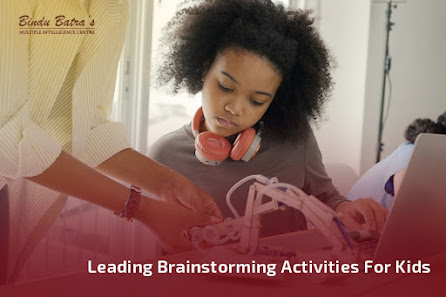How To Tackle Real Life Issues With Play Based Learning?
The significance of learning through play is sadly underrated even today. Little do people realise that play is at the core of a child's cognitive development. It stimulates creativity in young minds and prompts the little ones to explore and discover their physical world, express emotions, strengthen their vocabulary, and grow into thriving and confident adults. Aren't you eager to watch your child at his/her creative best, independent, and self-reliant? Enrolling young students in curriculums that implement play based learning is the right step forward.
Play creates a positive impact on early childhood pedagogy. Before delving deep to figure out how it is crucial to understand the ultimate goal of education first. Have you ever brooded over the real purpose of education? In a world where discovery and creative insights matter big, why are grades and scores still reckoned as standardised assessments of a successful learner? Isn't it crucial to nurture and train innovative and creative minds first? Play-based learning is an evolution in the world of elementary-level academics. It advocates young scholars to reckon education as an engaging and life-long process of joy, new learning, and discovery.
Why is play-based learning critical?
An unhurried and supportive learning environment is quintessential for children to grow – do you agree? Educators in present times realise the importance of connection, presence, and engagement to mentor and school young minds. Hence, brainstorming for kids and play-based activities have gradually sneaked into the academic modules practised at schools and especially at multiple intelligence centres like Bindu Batra's Sparkle Minds. The thrill and joy of playtime are naturally hardwired in each one of us, and children are certainly no exception. It inspires the little ones to stretch their imagination, discover their interests, and brainstorm strategic ideas to achieve victory. What's more? Through play, kids mature in terms of emotion and cognitive capacity and passively work on their confidence to engage and tackle new experiences.
Are you incredibly curious to learn more about how play-based learning nurtures a child's holistic development? Let's keep reading:
1. Impressive development of cognitive skills
Gone are the days when textbook knowledge was enough to educate a child about its whereabouts and the world around them. It is all about experiences now that encourage children to explore, play, and get the hang of the real world around them. Hence, plays and multiple intelligence activities for kids stand out as significant new introductions that work on a child's problem-solving abilities, creativity, and critical thinking skills.
Are you still not sure how? Let's explain! Give a child a stack of blocks to build towers. The activity stirs the young mind to recognise shapes and sizes. Besides, it motivates the kids to think of ways to assemble and put the blocks together to create a desirable tower. Have you ticked off the list of abilities and skills the activities support and the incredible way to teach the little ones of shapes, sizes, gravity, balance, and more without taking away the fun from learning? That's your answer on how play-based learning sharpens creativity and intelligence in young learners.
2. Literacy and language development
Very few truly realise that one of the striking benefits of play-based learning is language development and improved literacy. Plays and drills encourage children to explore the meaning of words and create their very own structure to communicate and express. This naturally enhances communication abilities in the little ones and exposes them to a world of new words, concepts, and theories without any boredom. Of course, proficient mentoring is equally crucial to helping scholars figure out the right pronunciation and meaning of words and where and how to implement the words mindfully.
Bindu Batra's Sparkle Minds, a renowned, multiple intelligence centre in Delhi, offers a holistic and play-based curriculum to nurture and train young minds the right way. The institution offers activities and brainstorming for kids that focus on sprucing up communication, social-emotional well-being, cognitive encouragement, and life skills, helping children transform into confident and well-rounded leaders of tomorrow.
3. A positive attitude towards education
It is no secret that learning can be boring and exhausting for young minds. What's worse? Textbooks fail to lure a child into learning. Hence, a play based learning module helps optimise a child's eagerness towards learning. The fun in games and interesting new discoveries keep the little ones engaged and more than curious to keep wanting to explore more. In short, playful activities keep a child's interest in learning right on fleek and promote a lifelong love for learning.
The benefits of play based learning are quite significant. It fosters intelligence and creativity in young learners and equips the little ones with the right insight and tools to tackle real-world issues.
Source URL - https://bindubatra.com/blog/how-to-tackle-real-life-issues-with-play-based-learning


Comments
Post a Comment